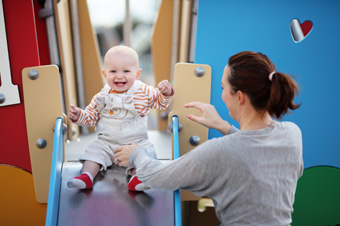Toddlers' Social and Emotional Development From 12-18 Months

Between 12 and 18 months is a fun age for toddlers (and their parents!). Your child is probably enjoying being the centre of attention and hamming it up for family and friends. Here's what else you can expect in terms of social and emotional development.
Social and Emotional Milestones
At this age, toddlers may resist any limits you set, but that's just part of developing their own unique personality - toddlers can be very entertaining and funny! Your typical 12 to 18 month old also:
- Loves being the centre of attention.
- Plays best alone.
- Dislike sharing toys.
- Copies adult activities, such as driving a car, reading, or cooking.
- Separates from you for brief periods of time.
- Changes food likes and dislikes often.
- Enjoys familiar places.
- Boldly explores and tries new things.
- Takes risks, if a trusted adult is present.
- Identifies herself in a mirror or photo.
- Hugs and kisses parents and other very familiar people and pets.
Play and Activity
You can support your toddler's social and emotional development by creating and sticking with regular routines and setting reasonable limits and consequences.
Here are some more tips for nurturing your child socially and emotionally:
- Offer choices you are comfortable with: "Do you want to put your coat or your shoes on first?"
- Have happy goodbye routines when you and family members leave each other.
- Allow your toddler to help with chores. Your toddler could put clothes in the laundry basket, pick up toys, or put away clean clothes.
- Provide regular chances for your toddler to play beside children the same age.
- Don't force your toddler to play with other children.
- Play with your toddler and teach sharing.
- Use "yes" and "no" to clearly set reasonable limits. Briefly explain your reasons and be consistent.
- Model good manners: use "please" and "thank you."
- Continue to breastfeed.
- Comfort your toddler, especially when he is upset, sick, or hurt.
- Create many happy moments, such as family meals and bedtime routines.
- Give your toddler opportunities to feel successful.
- Allow your toddler to play on her own.
- Talk about emotions: "You seem to be really happy!"
- Read stories and look at pictures that focus on emotions.
- Talk about changes in routines.
Other Social and Emotional Milestones
Between 12 and 18 months your toddler may also:
- Cooperate, or not.
- Want to do things independently.
- Fight with other children while learning to share.
- Show jealousy when attention is given to other family members.
- Get frustrated easily.
- Display a sense of owning toys and people.
- Enjoy older children but not play with them.
- Have a security toy or blanket.
Resources & Links:
HealthLink BC: Emotional and Social Development, Ages 12 to 24 Months
-
Some youngsters seem born to draw -- grasping onto a crayon or pencil the first time you offer it and creating rudimentary scrawling and scribbling artwork at every opportunity -- while other toddlers begin more hesitantly and need a little guidance.
-
First, the good news: Since the dawn of time, toddlers have been throwing temper tantrums out of frustration and in order to get the things that they desire. Most temper tantrums are not violent affairs but do involve lots of tears and yelling. Re
-
The term toddler typically refers to children who are between 1 and 3 years old. During this stage, children are building and refining important physical, social, emotional and cognitive developmental skills. Toddlers are much more aware of their imm


